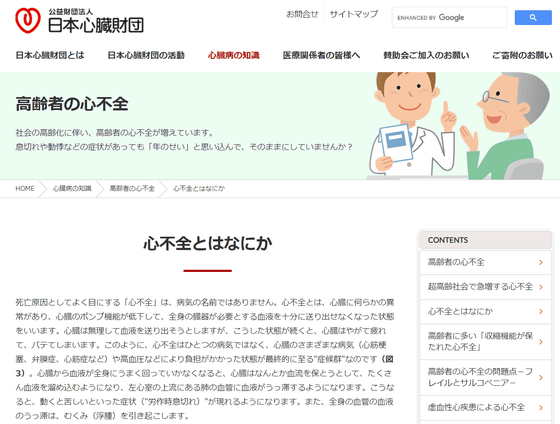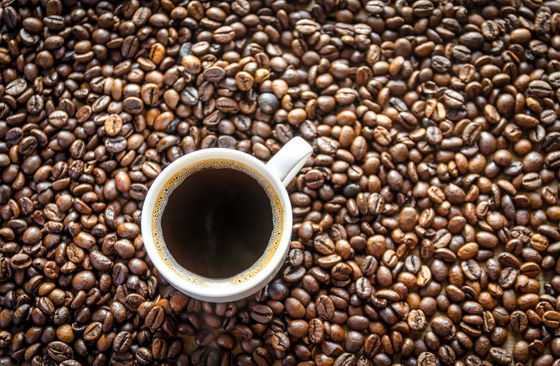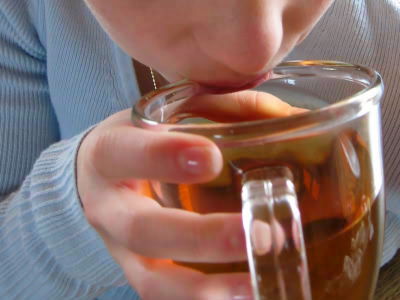Research Results That Drinking Coffee 'Reduces the Risk of Heart Failure'

Studies have shown that coffee has
Association Between Coffee Intake and Incident Heart Failure Risk | Circulation: Heart Failure
https://www.ahajournals.org/doi/10.1161/CIRCHEARTFAILURE.119.006799
Coffee Drinking Tied to Lower Risk of Heart Failure --The New York Times
https://www.nytimes.com/2021/02/18/well/eat/coffee-drinking-tied-to-lower-risk-of-heart-failure.html
'Heart failure' does not refer to a specific illness, but to a condition in which something is wrong with the heart and the heart's pumping function is impaired, preventing the organs throughout the body from pumping enough blood. When blood does not flow from the heart to the whole body, the heart manages to maintain blood flow and accumulates a lot of blood, resulting in poor blood flow in the lungs upstream of the left ventricle. This blood flow eventually leads to swelling of blood throughout the body and causes various symptoms such as pain when moving.
What is Heart Failure? | Heart Failure in the Elderly | Knowledge of Heart Disease | Japan Heart Foundation
https://www.jhf.or.jp/check/heart_failure/02/

A new study by David Kao and colleagues at the University of Colorado School of Medicine says that coffee reduces the risk of heart failure. Kao et al. Investigated the symptoms and risk factors of cardiovascular disease through a long-term follow-up of 5,209 subjects in Framingham, Massachusetts, funded by the National Institute of Cardiopulmonary Blood. The Framingham Heart Study (FHS), a 10-year follow-up study of 5,888 elderly people aged 65 and over to identify risk factors for cardiovascular disease associated with the development of coronary heart disease and stroke ( Cardiovascular Health Study (Frasingham Heart Study (FHS)) CHS) ”, a five-year follow-up of the risk of cardiovascular disease in 15,792 late-middle-aged subjects aged 45 to 64 years,“ Atherosclerosis Risk in Communities (ARIC) ”, three large-scale surveys analyzed by machine learning Then, I investigated 'the factors that most affect heart failure'.
The study found that 204 factors were involved in the risk of heart failure. Among them, 41 species of factors such as smoking, marriage status, BMI, and cholesterol were confirmed to have a particularly large effect.
Among the 41 types that are said to have a particularly large impact, 'coffee' is particularly noteworthy. In all three large studies, FHS, CHS, and ARIC, coffee was associated with a lower long-term risk of heart failure than any dietary factor.

However, the risk of heart failure that coffee lowers is highly dependent on the amount you drink. According to this study, one cup a day is ineffective, but two cups a day reduces the risk of heart failure by 31%, and three or more cups a day reduces the risk by 60%. Regarding the difference between 3 cups and 4 or more cups, it is said that no conclusion could be drawn because only a few subjects drank 4 or more cups a day.
On the other hand, research results have been announced that coffee 'reduces the risk of stroke' and 'reduces the risk of coronary heart disease', but in this study, such stroke and coronary heart disease have been announced. The risk reduction effect of was not confirmed.
In this study, we could not obtain information on the type and method of adding coffee beans, and the amount of sugar and cream added, so they are excluded. However, caffeine-less coffee has been shown to be unrelated to reducing the risk of heart failure, Kao said, 'caffeine may play an important role in reducing the risk of heart failure.' I am.

In response to the question, 'Should I drink coffee or drink more to prevent heart failure?', Kao said, 'There is not enough information in the current research.' Needs additional research. '
Related Posts:







